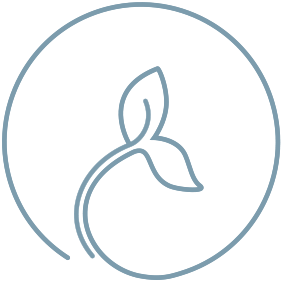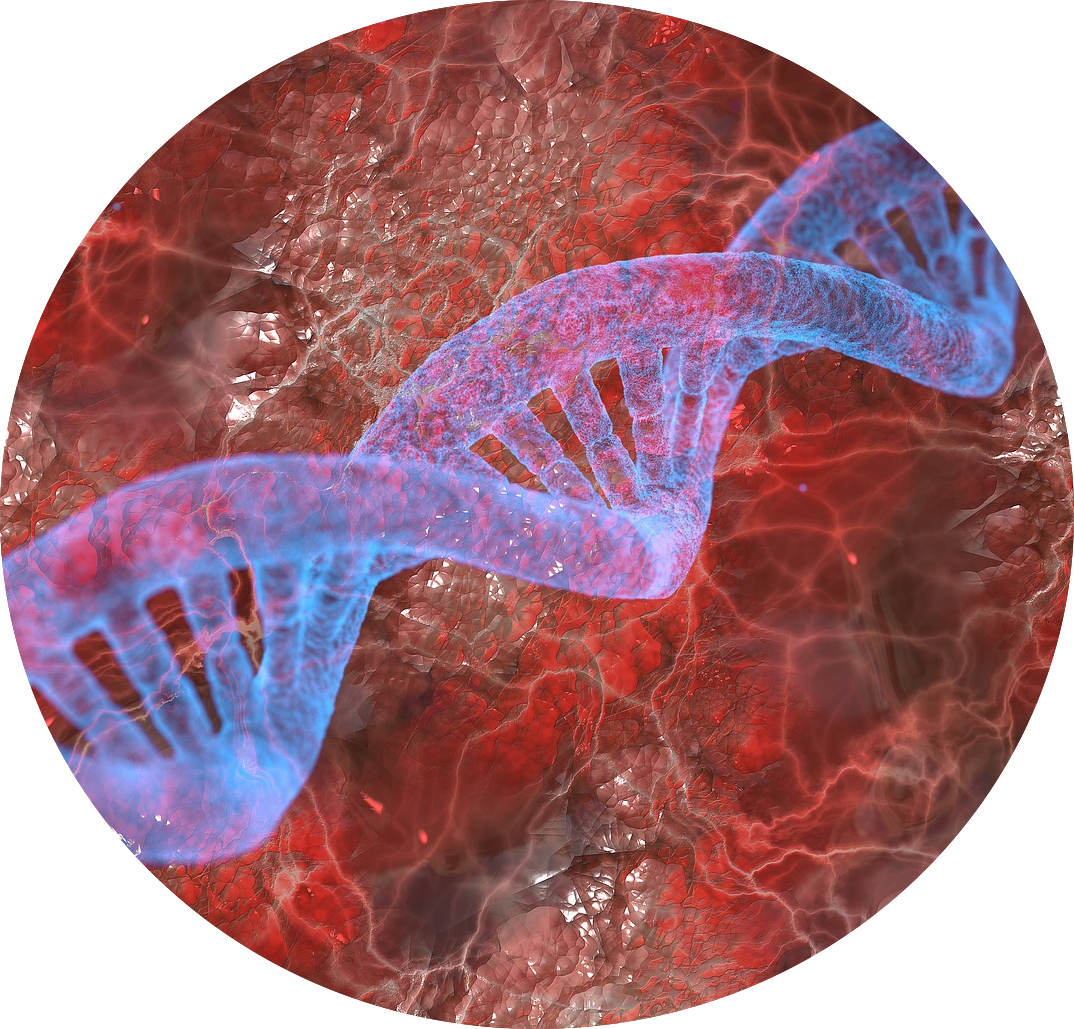
Panorama
From week 9+0 and forward.
Panorama is not eligible for discount and cannot be done on Fridays after 15 pm.
If you book your appointment after 4PM or on weekends, the sample will get sent to the lab the next business day. This will prolong the turnaround time with the amount of days in question.
Try our guide to see which NIPT test is right for you.
Below you will see a lot of information. Please make sure that you have read and understood everything before deciding on a Panorama test. Scroll down and click on the links for detailed information on chromosome anomalies and how Panorama works. The links all take you to the same page so once you are there you can stay and read the full list. At the bottom of this page you will find a glossary. If you need more information you are very welcome to contact us. Either way you will receive counselling prior to the test when you arrive at the clinic.
The test takes 30 minutes regardless of the package you choose and always includes a scan, a print with the scan results, one color photo of your baby and all the images and clips from the scan in Tricefy. You can buy extra color photos at the price of dkk 20/pc. It depends on the fetus’s age what we can see in the scan.
In case the NIPT test cannot be performed due to fetal issues, or if you change your mind after receiving counseling, and before your consultation is over, you will get charged for an Early Scan (not eligible for discount).
After the scan we will draw blood from your arm to fill two test tubes. You will need to sign a consent form (received in an e-mail after you book your appointment). After about 10 business days we will call you with your test results and afterwards you will receive the results via encrypted e-mail.
Please note: All samples are different and sometimes the lab needs extra time to analyze yours. This is usually not an indication that something’s wrong but it can extend the turnaround time with some days.
There are two packages to choose from:
Package 1:
Price DKK 4000,-*
Screening for trisomies 21, 18 and 13 (some of the most common chromosome anomalies including Down Syndrome). X and Y (sex chromosome anomalies including Turner (singletons, non-egg donation and monozygotic twins only). Triploidy (an extra set of chromosomes causing organ malformation, a high incidence of miscarriage and short lifespan (singletons and non-egg donation only), DiGeorge/22q11.2 (heart malformations, immune system problems, special facial features (singletons, non-egg donation and monozygitic twins only). Gender optional.
Package 2:
Price: DKK 5000,-*
Not available for twins and donor eggs
The test includes screening for trisomies 21, 18 and 13 (some of the most common chromosome anomalies). X and Y (sex chromosome anomalies including Turner). Triploidy (an extra set of chromosomes causing organ malformation, a high incidence of miscarriage and short lifespan). DiGeorge/22q11.2 (heart malformations, immune system problems, special facial features). Prader-Willi (growth problems, intellectual challenges, obesity), Angelmann (severe intellectual disabilities, seizures, problem with balance), 1p36 deletion (intellectual disabilities, seizures), Cri-du-chat (moderate to severe intellectual disabilities, sometimes malformations). Gender optional.
However accurate, the Panorama test is a risk assessment and not a diagnostic tool. If your test results come back with a high probability of chromosomal abnormalities then further investigation, such as an amnio* or a CVS*, is advised.
What is Panorama?
The Panorama test is a very accurate Non Invasive Prenatal Test (NIPT) which screens for chromosomal anomalies. The test can be done from 9 full gestation weeks throughout the pregnancy and applies to those wanting a highly accurate risk assessment for chromosomal abnormalities in the fetus, without putting the pregnancy at risk. For egg donor or surrogate pregnancies Panorama checks for trisomies 21, 18, 13 and gender (singletons only).
Panorama is the only NIPT that tests for triploidy.
You can opt for gender identification regardless of package, even for twins!
- Whether your twins are monozygotic (from the same egg) or dizygotic (from separate eggs)
- The gender of each twin
If screening reveals monozygotic twins, Panorama can additionally screen for:
- Monosomy X (Turner)
- Sex chromosome trisomies
- DiGeorge/22q11.2 deletion syndrome (optional)

More information about twins and zygocity at the bottom of this page.
How does it work?
- There are always pieces of genetic information (cell-free DNA) floating in our bloodstreams.
- When a woman is pregnant, pieces of genetic information from the placenta (cell-free fetal DNA) are released into her bloodstream and mix with her own genetic information.
- It is possible to test the mixture of DNA and determine if there is a high or low probability that the baby has certain chromosomal abnormalities.
- Testing this cell-free fetal DNA is called non-invasive prenatal testing/screening, or “NIPT/NIPS” (non-invasive as all it requires is a standard blood sample from the mother’s arm).
- Fetal fraction (the proportion of DNA in the blood sample that comes from the pregnancy) can affect the accuracy of a NIPT test.
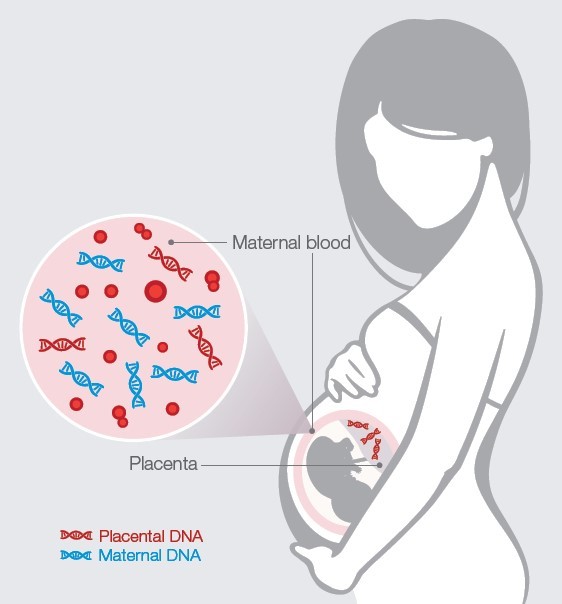
How accurate is Panorama?
Panorama evaluates SNPs – the 1% of our DNA that makes us different from one another. Panorama provides a significantly safer risk assessment than traditional screening methods. With a sensitivity of over 99% for trisomies 21, 13, triploidy and gender and 98,2% for trisomy 18, it helps reduce the number of women undergoing unnecessary invasive diagnostic procedures* (placenta biopsy and amniocentesis) – only if Panorama shows a high risk of chromosomal changes those are recommended. Panorama called fetal sex with 100% accuracy in 14,486 pregnancies (read the article).
Overall we are pleased to announce the latest news: Analyzing information from over 2 million tests performed, artificial intelligence (AI) was used to develop Panorama AI
Panorama AI combines the SNP based technology of Panorama with AI to give highly accurate results for difficult-to-call cases:
- Maintaining industry-leading accuracy for aneuploidies while significantly reducing no-call rates (cases where the Panorama test yielded no result)
- Improving 22q11.2 deletion detection accuracy and detection of smaller nested deletions (increasing the accuracy in detecting diGeorge)

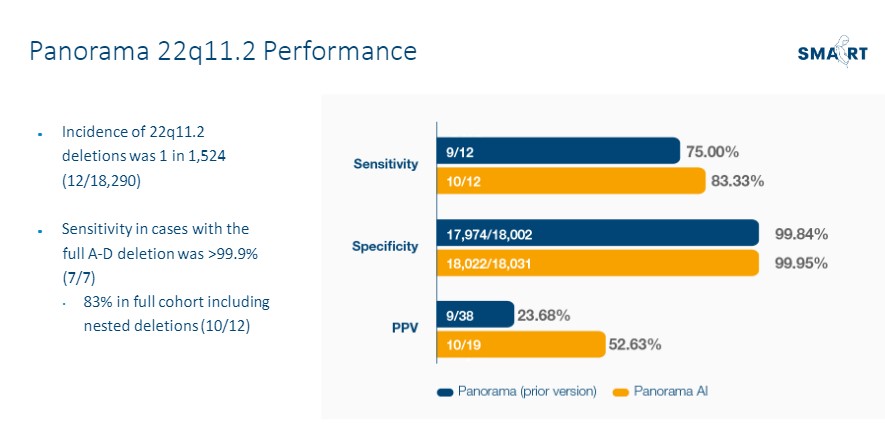
You can have a Panorama test if you can say yes to one or more of these criteria:
- You are between 9 and 40 weeks pregnant
- You are expecting one or two babies
- You have a history of pregnancy with trisomy
- Fetal ultrasonographic findings indicating an increased risk of aneuploidy or you are not comfortable with the results of your first trimester scan
- You have received IVF Treatment or have previously suffered from habitual abortion
- Contraindications for invasive prenatal testing, such as placenta previa, risk of miscarriage or HBV infection
- You just want the extra security
You are not a candidate for Panorama if:
- You are less than 9 weeks pregnant
- You or the fetus have a known mosaicism (mixture of normal and abnormal chromosomes in the mother, fetus or placenta)
- There is a known balanced or unbalanced translocation on your chromosomes
- You have been given organ transplantation
- You have received stem cell therapy
- You have experienced “Vanishing Twin”
- You are expecting triplets or more
- You are expecting twins by egg donor or surrogate pregnancy
Application table:

I an a small number of cases there is insufficient DNA in the blood sample or other conditions that make it impossible to complete the test and it will be necessary to resample. There are no additional costs associated with this, but there will be a delay getting your test results. If you do not wish to come in for a resample you will not receive a refund.
In very few cases the test can still not be completed despite a new blood test. In this case the full amount of the price paid will be refunded.
If the fetal fraction is less than 7% it won’t be possible to analyze for Angelman and you will keep your background risk. This does not lead to a refund.
Atypical findings: Very rarely we receive a report that results in ‘Atypical findings’. The meaning of this is that there is suspected findings outside the scope of the test, which may include, but is not limited to, fetal mosaicism, fetal chromosome abnormality, maternal chromosome abnormality, or a normal variation. In these cases it is not possible to test for the syndromes or gender as originally planned but as there is an elevated risk of chromosome abnormality in the mother, the placenta and/or fetus it is reccomended to proceed with genetic counseling with the option of comprehensive ultrasound evaluation and diagnostic testing.* These cases are not elligible for a refund.
Glossary:
- Aneuploidy: An aberration in the chromosome set (karyotype) in the form of too many or too few chromosomes. Normally we have 46 chromosomes in our cells – 23 from the mother and 23 from the father. These are arranged in pairs. The chromosomes consist of DNA and determine – among other things – our appearance and gender (XX for girl and XY for boy). In aneuploidies, the number of chromosomes is altered (e.g. 45 or 47). The consequence of the aneuploidy depends on which chromosome pair is affected. Examples of aneuploidies are Down’s Syndrome and Turner’s Syndrome.
- Trisomy 21, Down’s Syndrome – an additional chromosome 21, i.e. 3 where there should have been 2 (tri = 3). One of the most common forms of developmental impairment.
- Trisomy 18, Edward’s syndrome – an additional 18th chromosome. Malformations and severe mental retardation. Short lifespan. Rare.
- Trisomy 13, Pataus syndrome – an additional 13th chromosome. Malformations and severe mental retardation. Short lifespan. Rare.
- Turner’s Syndrome – missing or altered sex chromosome (X) in girls.
- Triploidy – an extra set of chromosomes causing organ malformation, a high incidence of miscarriage and short lifespan.
- Microdeletions – Microdeletions are caused when a chromosome is missing a small piece. The severity of problems caused by a microdeletion is determined primarily by the size and location of the deletion.
- Placenta biopsy (Chorion Villus Sample (CVS)* – invasive test where small pieces of the placenta are retrieved through a thin needle in the mother’s abdomen for chromosome analysis. Possible from week 10.
- Amniocentesis (AC)* – invasive test where amniotic fluid is retrieved through a thin needle in the mother’s abdomen for chromosome analysis. Possible from week 16.
- Twins – Monozygotic: Identical, from the same egg. Dizygotic: Fraternal, from two seperate eggs. Monochorionic: Share the same placenta, always monozygotic. Dichorionic: Have each their own placenta. Usually dizygotic, but can be monozygotic.
- About sensitivity, specificity, positive and negative predictive value in Panorama:
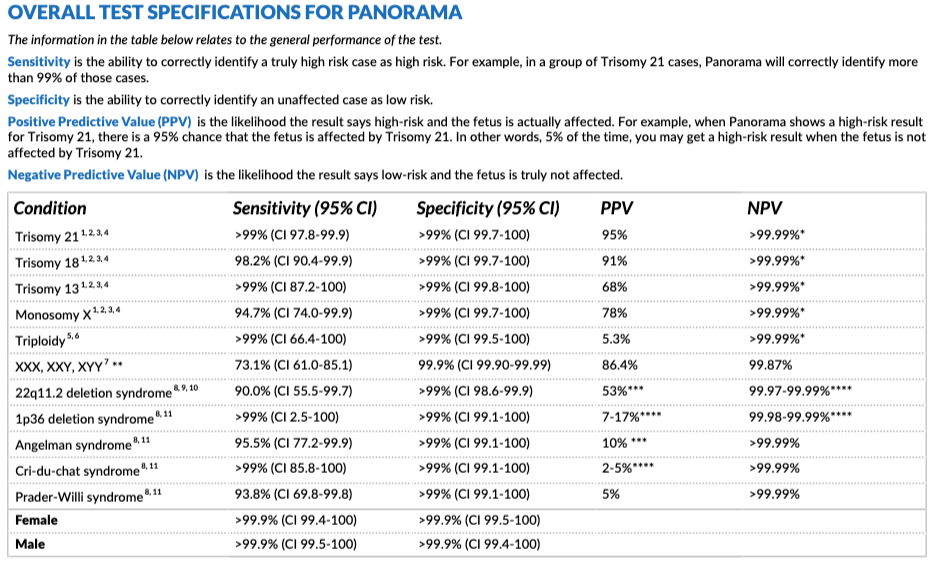
*Invasive diagnostic tests are not performed at Spire. It is your own responsibility to take your results to the relevant health care center if needed – but we are happy to help you along in this proces!
*Prices are subject to change
At Spire you will meet a professional team of sonographers. We do all types of pregnancy scans including 3D and 4D. We have the latest equipment ensuring great looking images with all scans.
We are registered with the Danish Patient Safety Authority.
Follow us
